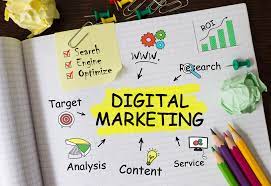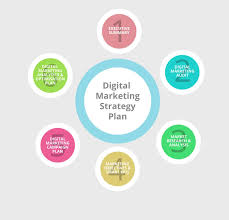The Power of B2B Digital Marketing Strategy
In today’s competitive business landscape, having a strong B2B digital marketing strategy is essential for companies looking to thrive and grow. Unlike B2C marketing, which targets individual consumers, B2B marketing focuses on businesses as customers.
One of the key advantages of B2B digital marketing is its ability to reach a highly targeted audience. By leveraging data analytics and targeting tools, companies can identify and connect with decision-makers within other businesses who are most likely to be interested in their products or services.
Another benefit of B2B digital marketing is its cost-effectiveness compared to traditional marketing methods. With digital channels such as email marketing, social media advertising, and content marketing, companies can reach a wide audience at a fraction of the cost of traditional advertising.
Furthermore, B2B digital marketing allows for greater flexibility and agility in adjusting strategies based on real-time data and feedback. Companies can quickly optimize campaigns, test different approaches, and measure results to ensure maximum ROI.
Building a strong online presence through search engine optimization (SEO) and content creation is also crucial for success in B2B digital marketing. By creating valuable and informative content that addresses the pain points of potential customers, companies can establish themselves as industry leaders and build trust with their target audience.
In conclusion, a well-crafted B2B digital marketing strategy is essential for companies looking to stay competitive in today’s digital age. By leveraging the power of targeted advertising, cost-effective channels, flexibility in campaign management, and building a strong online presence, businesses can effectively reach their target audience and drive growth.
Top 6 Frequently Asked Questions About B2B Digital Marketing Strategy
- What is B2B digital marketing?
- How is B2B digital marketing different from B2C?
- What are the key components of a successful B2B digital marketing strategy?
- How can data analytics be used in B2B digital marketing?
- What role does content marketing play in B2B digital marketing strategy?
- How can companies measure the effectiveness of their B2B digital marketing campaigns?
What is B2B digital marketing?
B2B digital marketing refers to the use of digital channels and strategies to promote products or services from one business to another. It involves leveraging online platforms such as websites, social media, email marketing, and search engines to reach and engage with other businesses as potential customers. B2B digital marketing focuses on building relationships, generating leads, and driving conversions in a business-to-business context. By utilizing data analytics, targeted advertising, and content marketing, companies can tailor their strategies to meet the specific needs and preferences of other businesses, ultimately driving growth and success in the competitive B2B marketplace.
How is B2B digital marketing different from B2C?
In the realm of digital marketing, the distinction between B2B and B2C strategies is crucial. B2B digital marketing primarily targets businesses as clients, focusing on building relationships with decision-makers and addressing their specific needs and challenges. In contrast, B2C marketing targets individual consumers, aiming to create emotional connections and drive immediate purchasing decisions. While B2B marketing emphasizes lead generation, nurturing long-term partnerships, and providing in-depth industry knowledge, B2C marketing often prioritizes brand loyalty, visual appeal, and impulse buying behavior. Understanding these fundamental differences is essential for tailoring effective digital marketing strategies that resonate with the distinct audiences of B2B and B2C markets.
What are the key components of a successful B2B digital marketing strategy?
When considering the key components of a successful B2B digital marketing strategy, several crucial elements come into play. Firstly, understanding the target audience and their specific needs is essential for crafting relevant and engaging content. Utilizing data-driven insights to personalize marketing efforts and deliver tailored messaging is also vital. Additionally, leveraging various digital channels effectively, such as email marketing, social media, SEO, and content marketing, helps in reaching and engaging the right audience. Furthermore, establishing clear goals and KPIs, continuous monitoring and analysis of campaign performance, and adapting strategies based on insights are crucial for driving success in B2B digital marketing. Ultimately, a successful B2B digital marketing strategy hinges on a well-rounded approach that combines audience understanding, personalized content delivery, multi-channel engagement, data-driven optimization, and agile campaign management.
How can data analytics be used in B2B digital marketing?
Data analytics plays a crucial role in B2B digital marketing by providing valuable insights that help businesses make informed decisions and optimize their strategies. By analyzing data from various sources such as website traffic, email campaigns, social media engagement, and customer interactions, companies can gain a deeper understanding of their target audience’s behavior and preferences. This data can then be used to personalize marketing efforts, improve targeting accuracy, measure campaign performance, and identify areas for improvement. Ultimately, data analytics empowers businesses to enhance the effectiveness of their B2B digital marketing initiatives and drive better results.
What role does content marketing play in B2B digital marketing strategy?
Content marketing plays a crucial role in B2B digital marketing strategy by serving as a powerful tool to engage, educate, and influence potential business customers. In the context of B2B marketing, content serves as a bridge between companies and their target audience, providing valuable information, insights, and solutions to address the specific needs and challenges of businesses. By creating high-quality content such as whitepapers, case studies, blog posts, and videos that resonate with decision-makers, companies can establish credibility, build trust, and position themselves as industry experts. Effective content marketing not only drives brand awareness but also nurtures leads throughout the buyer’s journey, ultimately contributing to lead generation and conversion in the B2B space.
How can companies measure the effectiveness of their B2B digital marketing campaigns?
Measuring the effectiveness of B2B digital marketing campaigns is crucial for companies to optimize their strategies and drive better results. Companies can track key performance indicators (KPIs) such as website traffic, lead generation, conversion rates, email open rates, social media engagement, and return on investment (ROI) to gauge the success of their campaigns. By using analytics tools and tracking software, businesses can monitor the performance of their marketing efforts in real-time and make data-driven decisions to improve their overall digital marketing strategy. Regularly analyzing and interpreting these metrics allows companies to identify what is working well and what areas need improvement, ultimately leading to more successful B2B digital marketing campaigns.




